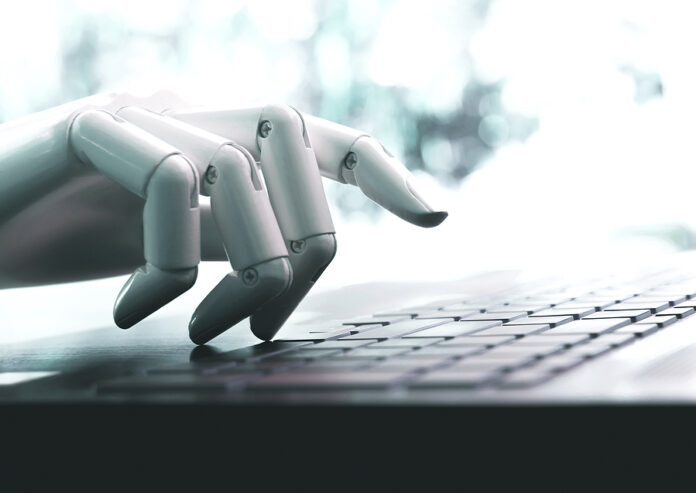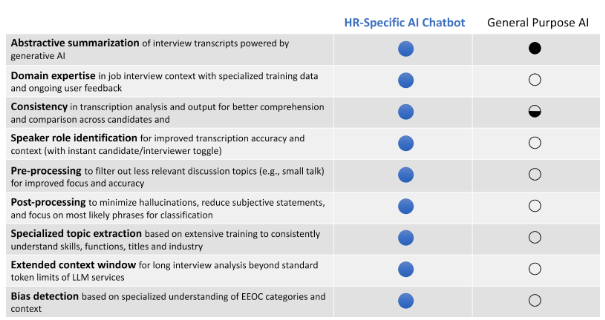
By Richard Mendis, CMO at HireLogic
Disclaimer: Don’t try this with ChatGPT
When it comes to interview intelligence, not just any AI or chatbot is reliable for enhancing the interviewing and hiring process. There’s no room for hallucinations or subjective influence on decisions, as those could lead to potential bias or violation of employment regulations.
Chatbots that interact with candidates to assist with administrative tasks like scheduling interviews have been widely used for years. But through the advancement of generative AI, chatbots have now become sophisticated and specialized enough to sort through objective candidate data and provide straightforward answers to questions on the talent acquisition side of the hiring process. When combined with candidate insights gathered automatically through interview intelligence, these niche chatbots can significantly streamline hiring and make the process more data-driven to ensure the best possible candidate match.
The difference between HR-specific AI and broadly used platforms like ChatGPT is that HR-specific chatbots are trained to focus on relevant information and avoid language that has the potential to be subjective or lead to bias during the hiring process. They work exclusively off of objective candidate data and have been trained to distinguish subtleties like the difference between a skill and a job title. Here are a few key ways to incorporate recruiting-specific AI and chatbots into your hiring process.
Simplify pre-interview tasks
Recruitment-specific AI and integrated chatbots can radically simplify pre-interview tasks, starting with creating a consistent set of questions for interviews. Being prepared with the right types of questions and organized interviews has been shown to provide a better candidate experience, and this method gives you better data to compare candidates in a standardized way. A report from the McGill Dept. of Psychology EDI committee found that decisions informed by unstructured interviews (those without a standardized set of questions) are more susceptible to a variety of biases and implicit stereotyping pertaining to gender, ethnicity, sexual orientation, and potential disabilities of the candidates. Leveraging a chatbot allows hiring managers to create a consistent set of questions even when they’re short on time, allowing them to adhere to well-researched hiring best practices.
Intelligent candidate summaries
It’s easy for recruiters and hiring managers to forget what was discussed during interviews because they often have an overwhelming number of candidates with similar backgrounds. Recruiting-specific AI and conversational chatbots can swiftly provide an intelligent candidate synopsis based on resume and interview data so recruiters can remember the key takeaways and discover additional details about the candidate they may have initially missed. Questions and responses can instantly be summarized, and AI can even interpret and parse data into categories such as experience, leadership qualities, KPIs, and more.
Enable deeper candidate discovery and standardize comparison
After the interview, you can ask recruiting chatbots questions like whether a product management candidate is a better fit for a product management or product marketing role. The chatbot extracts objective facts from interview data to provide a succinct answer. Some recruiters require creating candidate summaries based on specific client questions, like “Does the candidate have experience with Salesforce?” The chatbot can easily find that information, saving recruiters the time of manually sorting through their interview notes across multiple calls.
You can also automate the chatbot to extract specific takeaways after every interview to standardize candidate comparisons. These solutions don’t replace human decision-making about who to hire but instead provide objective information faster, to support data-driven decisions that help eliminate unconscious bias.
Can’t you just input candidate data into ChatGPT and ask it questions that help you find the right fit?
ChatGPT can do a lot of things, but is not designed specifically for hiring decision-making. There are functional shortcomings and ethical concerns if you were to use general-purpose chatbots or large language models (LLMs) to support hiring decision-making.
Token limits
You can’t upload a long transcript due to the token limit. Even if the token limit were nonexistent or you use APIs, developing a user-friendly custom application that uses multiple services to record, transcribe, and upload the interview is clunky. On the contrary, recruiting-specific chatbots work seamlessly with interview intelligence capabilities to collect and analyze objective candidate data.
Candidate recognition
ChatGPT doesn’t always understand the context of a conversation transcript. It may not be able to distinguish between candidates and interviewers, especially in a panel-type interview setting. So, if you ask it for a synopsis of the candidate’s experience, it may mention things that the interviewer said, whereas a recruiting chatbot is trained to filter out all small talk and discern the candidate from the interviewer. As such, more pre-processing would have to be conducted to make sure that ChatGPT knows who the candidate is, which makes it harder to use in an automated way.
“Small talk” filters
If you drop an interview transcript into ChatGPT, it may not be able to distinguish what’s casual conversation versus what’s part of the formal interview. If you spent time at the start of the call talking about the weather or what you did on vacation, that information may be mixed in with actual job skills or experience, making the results less accurate.
Subjectivity, accuracy, and consistency
ChatGPT is infamous for generating subjective and factually inaccurate statements. In the context of evaluating job candidates, ChatGPT may say “The candidate is articulate and communicative.” The issue with this statement is that “articulate” is not an objective fact; it’s subjective. What one person considers articulate, another person may consider awkward. This type of subjective evaluation can be harmful and discriminatory toward certain groups of candidates, such as people with disabilities or people who speak English as a second language.
HR-specific chatbots work by filtering out information that doesn’t meet strict subjectivity and accuracy criteria. Chatbots can only be impartial if they filter and focus on contextually relevant information to avoid hallucination and potential subjectivity, such as language that attempts to provide an opinion on whether someone is a good candidate or not. If you ask a correctly developed recruiting chatbot to rate a candidate on a scale of 1 to 5, it should not give you an answer, since that is a subjective question. But if you ask which candidates have the most experience with a particular skill, it should be able to provide you with a list of candidates and corresponding data from the interview.
Consistency is also an important factor when asking chatbots for candidate data to make comparisons or assist in hiring decisions. ChatGPT and other LLMs are not designed to be consistent when analyzing data and responding to prompts. In contrast, HR-specific solutions will be more consistent to ensure value when providing objective data on candidates for comparison purposes.
Privacy issues
Uploading a full candidate transcript into ChatGPT presents a potential privacy and security risk. Having an HR-specific platform minimizes the exposure of your candidate data to public services. Recruiting-specific chatbots combine the power of your proprietary candidate data and a large language model trained on public data, to give you answers that are relevant and more accurate to your interviews.

Chatbots complement interview intelligence by helping you complete important tasks before and after the interview, like drafting the job description, creating a list of standardized interview questions, and rediscovering particular candidate facts. When used together, these two AI technologies can streamline the hiring process, influence more data-driven decision-making, and reduce the potential for human bias. As recruiting chatbot technology evolves, its capabilities will continue to expand and revolutionize the way recruiters make informed, unbiased hiring decisions.
 Richard Mendis is the CMO at HireLogic. He has more than 20 years of experience in the enterprise software industry and currently works on AI solutions to help companies hire smarter and faster.
Richard Mendis is the CMO at HireLogic. He has more than 20 years of experience in the enterprise software industry and currently works on AI solutions to help companies hire smarter and faster.





